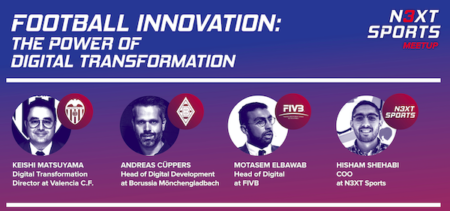
As the lockdown continues, and all economic sectors are heavily impacted, the sports industry finds itself asking fundamental questions about how it will emerge from this crisis. The current environment has given an opportunity to sports organizations to reconsider their modus operandi and understand the possibilities for engaging with fans, and creating a platform for brand engagement, and quickly adapting to complex environments.
For our second online Meetup entitled Football Innovation: The Power of Digital Transformation, we visited a strategic topic linked to the way sports organizations can take a step forward into the post-CoVid era. We had the pleasure of having Keishi Matsuyama, Andreas Cüppers, and Motasem Elbawab on the Meetup. Each of them shared their insights on topics related to digital transformation, from implementing a digital transformation process, to overcoming some of the challenges, and to how organizations right now are adapting to the current situation.
¨There is always a misconception about the topic of digital transformation, while many people think that it is about buying technology, it is actually looking at your current operations and every department and seeing how you can apply digital processes to improve efficiencies and create value¨. – Motasem Elbawab
One of the first things we underline with clients embarking on their digital transformation journey is the importance of having support from the leadership team. With this important step in place, the mindset of the organization changes and allows for a culture change that looks at the opportunities that digital can bring. A 2019 study by the MIT Center for Information Systems Research showed how companies with boards of directors that are digitally or technologically savvy significantly outpaced their peers on key metrics, including 38 percent higher revenue growth, a 17 percent higher profit margin, 34 percent higher market cap growth, and 34 percent higher return on assets.
As we live in the digital era, the way we work, the tools we manage, and even the way we live changes, which makes it a necessity for many football clubs to go through a digital transformation process. Many leadership teams have to see it as a critical process rather than a nice-to-have-process.
¨For us, starting our digital transformation process was a necessary step, as data is the basis for nearly everything and it should be the basis for nearly every decision the club makes in the future in the sports department¨. – Andreas Cüppers.
One of the main reasons many sports organizations go through a digital transformation process is to allow them to collect and analyze data from their fans, to get to know them in order to offer them the best possible experience.
During this global crisis, where there are no live sporting events, many industry experts are taking this “downtime” to allow new ideas, previously on the back-burner due to time constraints, to be further developed. Those organizations that are being proactive rather than reactive and have set their digital foundations will emerge from the crisis with a competitive advantage, which will pay dividends in the post-CoVid era.
¨I think this situation is actually going to accelerate the digital transformation process for many companies, and especially in sports. It’s going to test your ability to produce content and entertainment, do something original, work your brand, and most importantly keep connecting with your fans¨ – Keishi Matsuyama.
Football organizations such as Borussia Mönchengladbach and Valencia C.F. are taking this downtime to test their data capabilities, to foresee some developments, to anticipate things that will become relevant for their business and to adapt the different technologies into their company processes. Having set a digital foundation helps the organization to be ready to adapt to whatever happens with the landscape.
During the session, all three speakers agreed that when an organization is going through a change and willing to implement its digital foundation, the team has to take into consideration that there will be some fallbacks. Some of the most common ones are: 1) having the support from the CEO and the leadership team, depending on the culture of the club can be a big challenge, but it’s necessary to have their commitment. 2) Most people think that digital must be monetized immediately and it can be done just with technology. So helping people understand what this process is about, and the real value behind it.
¨The evolution of digital is going to be more into innovation because it will be embedded in each of the departments¨ – Motasem Elbawab
How is your organization approaching its digital transformation journey during this period? Where are you in your journey? Want to find out? Get in touch with our teammate Javier at javier@n3xtsports.com to find out more about some of our turnkey digital transformation projects, including a digital readiness assessment that can set you on your path.
If you were not able to make it to our online session, you can watch it here, also we would like to invite you to subscribe to our newsletter, and follow us on Linkedin, Twitter, and Facebook to stay up to date with any N3XT Sports news.



